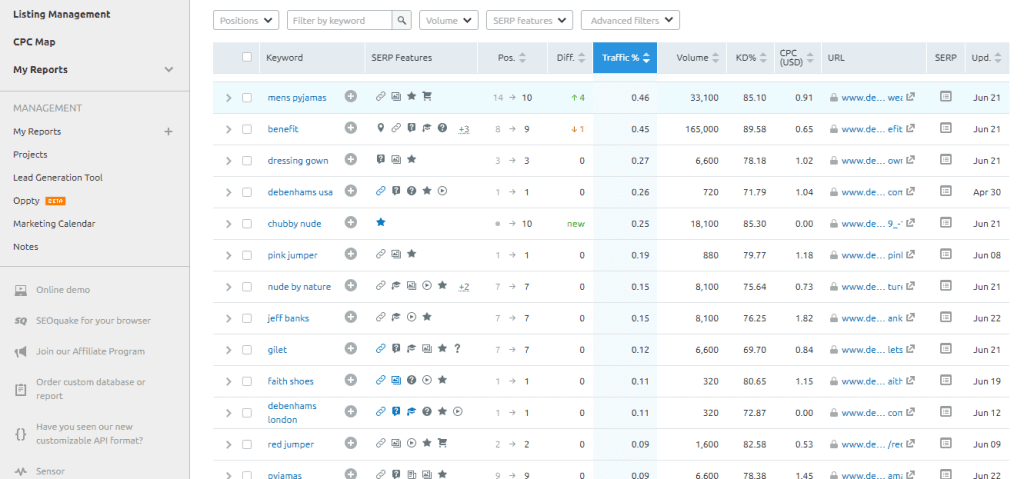If you are running an eCommerce store, your ultimate objective is to generate more sales. To accomplish this, you need to attract traffic from targeted audiences and convert them into loyal customers. The foundation of any successful SEO strategy lies in effective keyword usage.
Keywords play a vital role in connecting with potential customers who are actively searching for the products you offer. By incorporating the right keywords into your eCommerce website, you can enhance its visibility in search engine results pages (SERPs) and increase the likelihood of attracting relevant visitors.
In this guide, we will discuss the different strategies of keyword research for eCommerce websites and explore the tools available in 2023 that can elevate your SEO efforts. From understanding the significance of keywords to implementing an efficient research process, this guide will help you with the knowledge and tools needed to optimize your eCommerce SEO and boost its online presence.
Get ready to unlock the power of eCommerce keyword research and discover how it can help to reach your online business to new heights. Let’s dive in!
Why Is Keyword Research Important?
First of all, you must be aware of the term “Keyword”. Keywords are defined as the words or phrases that users use to find something on the search engine. It is also known as “Search Queries”.
Every time when someone does a search, then the search engine decides which results to show to its users. We all know that the topmost priority of a search engine is to display the best results to its users.
To do that, the search engines update their algorithms from time to time so that they can determine the relevant results for every search query. That is why, it is vital to choose the keywords wisely.

When a user triggers a query then the search engine finds the best result from its database by matching the user-searched keyword with the web pages that include the keyword and display it to its user.
It is essential to use the right keywords on the web pages of your website so that you can rank at the top position of SERP for the relevant search terms. By ranking at the top position on SERP, you can see a big difference in your traffic.
Before starting to do keyword research for an eCommerce website, you must be aware of some essential terms like search volume, long tail keyword, and competition.
Long Tail Keywords: They are simply keywords that include three or more than three words. It is a good practice to use long tail keywords because they have the intent to convert better as compared to short keywords.
These keywords have a better conversion rate because they help you to find people who are specifically looking for those products/services that you are offering. Through these keywords, you can basically reach your targeted audience.
Search Volume: It is also known as avg. monthly search volume because it is usually measured on a monthly basis. It is defined as the total number of searches for each keyword per month. Ideally, you should look for keywords that have a high search volume.
If a keyword has a high search volume then it means that it will be searched by a larger number of people. By targeting such keywords, you will get more potential traffic and conversion to your store.
Competition: While finding the best keywords, it is vital to consider the competition of the keywords. It is equally important as search volume. It defines the level of difficulty that a keyword has in ranking on the search engine. Ideally, you should choose those keywords that have high search volume & low competition.
You can use various tools like ahrefs.com, Google Keyword Planner, Keywords Everywhere, SEMrush, and Ubersuggest for doing effective keyword research for eCommerce.
What Is an eCommerce Keyword Research Strategy?
An eCommerce keyword research strategy involves identifying relevant keywords that potential customers use when searching for products online. It includes understanding the target audience, generating keyword ideas, analyzing their effectiveness, selecting the best keywords, and optimizing website content accordingly. The goal is to improve search engine visibility, attract targeted traffic, and increase conversions. It requires ongoing monitoring and adaptation to stay competitive in the changing era of search engine results.
Essential Steps for eCommerce SEO Keyword Research Strategy
- Understand your target audience i.e., check what they are searching for.
- Use keyword research tools to find out the best & relevant keywords.
- Choose those keywords that will convert the audience to permanent users.
- Choose 3 to 4 keywords for each category that you have.
- Try to choose the keywords that have low competition and high search volume.
- Understand your business and then choose the keywords accordingly.
Different Ways of Finding Relevant Keywords for eCommerce Product & Category Pages:
(A) Via Amazon
We all know that Amazon is a giant eCommerce website. It is one of the most popular ecommerce websites and studies have shown that most people visit Amazon in order to buy any product.
Let’s see how this works.
When you go on Amazon and type the keyword that describes the product you want to buy. Amazon will immediately show you the searches that people are using to find a similar product.
For example, you are looking for a “Women’s bag”. When you will type this search query on Amazon then it will show you more search terms related to your query. From here, you can choose the keywords that will be helpful for you. Choose those keywords and add them to your list of keywords.

Also, if you are selling different categories of women’s bags like tote bags, shoulder bags, etc then you can choose the category in Amazon and find out the category-related keywords easily.
This process will help you to find out the keywords for the eCommerce category pages. But how will you use Amazon for finding keywords for the product pages?
To do that, you have to visit the bestseller Amazon page: https://www.amazon.com/bestsellers
When you visit this page, you can navigate to the appropriate pages and find out the keywords & add them to the list.
(B) Via Google Search
After taking the idea of keywords from Amazon, it’s time to start your research on Google by visiting www.google.com
Google has a great feature known as “Google Suggest” that will help you in finding the most relevant keywords. Let’s see how this works.
Suppose you are searching the keyword “women’s bag” on Google. Once you will write your search query, Google will show you some of the keywords that people are using to search. Have a look at the below-attached screenshot. This feature is known as Google suggests.

You will also get the idea of more relevant keywords at the bottom of the SERP.

Check the monthly search volume and competition of the keywords and add them to the sheet.
(C) Via Keyword Research Tools
After following the above two steps, now you have enough keyword data. You can use that data while finding keywords by using tools.
As there are numerous tools available for doing keyword research, it is important to choose an ideal one. An ideal keyword research tool is one that will give you better insights into the search terms, monthly search volume, and competition. You can also use more than one tool to find out the best & relevant keywords.
Pro Tip: Include more long tail keywords (that include 4 to 5 words) in your list as such keywords are easier to rank.
(D) Spy on your Competitors’ Keywords
This is the easiest way to find the keywords that will work really well for your niche. Now, let’s understand how you can do this.
Step 1: Go to Google and search your target keywords.
Step 2: You can see a number of websites on SERP. Now, you have to filter the websites that are selling similar products.
Step 3: Go to SEMrush or Ahrefs, enter the competitor’s website URL, and check the list of keywords for which they are ranking.

Click on the “Organic Keywords Details” and export the keywords data.

Wrapping up:
In conclusion, conducting thorough keyword research is a crucial step in creating a successful eCommerce SEO strategy for your online store in 2023. There are two main approaches to doing the right eCommerce keyword research. First, start from scratch and gather a list of relevant keywords that potential customers might use. Second, analyze your competitors’ keywords to gain insights and learn from their success.
By combining these approaches, you can optimize your website and content to attract the right audience and improve your chances of converting them into customers. Continuously monitor and refine your keyword strategy to stay ahead in the competitive eCommerce market.
To conduct keyword research for an eCommerce website, here are the steps:
1. Understand your target audience.
2. Generate a list of potential keywords.
3. Analyze using keyword research tools.
4. Select high-volume, low-competition keywords.
5. Incorporate them into your website strategically.
6. Monitor and refine your strategy over time.
Keyword research is essential in eCommerce because of the following reasons:
1. It helps to attract targeted traffic.
2. To Improve search engine visibility.
3. To Increase conversion opportunities.
4. To Provide insights into competitors.
5. To enhance user experience.
6. To Support effective SEO and marketing.
Here is a list of the top keyword research tools for eCommerce:
1. Google Keyword Planner
2. SEMrush
3. Ahrefs
4. Moz Keyword Explorer
5. Ubersuggest
6. KeywordTool.io
7. SpyFu
Here are the steps to select the right eCommerce keywords for SEO success monitoring:
1. Ensure relevance to your products.
2. Consider search volume and competition.
3. Evaluate conversion potential.
4. Target long-tail keywords.
5. Align with overall SEO strategy.
Following are some key considerations for creating an effective eCommerce keyword strategy:
1. Understand your target audience.
2. Identify relevant and high-potential keywords.
3. Balance search volume and competition.
4. Strategically incorporate keywords into the content.
5. Monitor and adapt to performance and trends.
6. Stay updated with search algorithms and user preferences.
7. Continuously refine and optimize your strategy.





